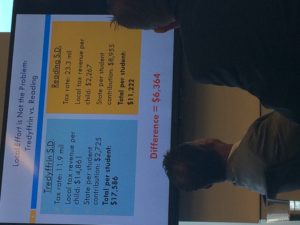So I have an announcement!
Some of you who know me know that I started my career in real estate over 10 years ago. It started off as a side-hustle to my full time job, which eventually replaced my full-time job. Cisco getting laid off from his “cushy/secure” job just 3 months before we got married is what motivated us to start seeking additional streams of income outside of our jobs. I was living in NY and I just wrapped up a consulting gig before making the move back to Philly. Granted, he ended up securing a new position within the same company within weeks. But it was just the push we needed to realize that could happen to either of us at any given time and we needed to have more control over our financial destiny.
You know those “flip houses with no money” real estate commercials? Yup, that’s how I got started. Now, I’m not going to go into the details of what I did, or what we learned during that time. Much of what is taught is true, but it’s definitely not as easy as it is portrayed. This was before kids, and Cisco and I were so enthusiastic about building a lifestyle that allowed us some flexibility with our schedules. It was a time in our lives where our mindset shifted and we wanted to create an income that wouldn’t require both of us to be at a job.
So anyhow, to cut a long story somewhat short, we went through lots of real estate training and had lots of mentors, which we are extremely grateful for. After doing a number of deals, I left my job and we got into residential house flipping. Cisco stayed at his job while I focused on earning my income through real estate. Without kids, totally manageable. The big mistake I made was not setting our systems up so that the time required for me to be in the business was minimal. I knew that being “self-employed” according to Robert Kiyosaki’s Rich Dad Poor Dad, was not what I wanted to be. But that’s what I created. I created the marketing for the sellers and buyers. I did cold calls and walk-throughs. I raised the money- meaning, I put the numbers together for everything and met with investors. I created the marketing when the house went up on the market. I mean, everything. There was a point where I did get help using an answering service to screen phone calls, virtual assistant to help with some administrative tasks, and used contractors to do my walk throughs. But I can’t say that even those processes were seamless. So yes, doing that without kids is totally manageable. Doing all that with kids, without systems in place, was exhausting.
So I decided a couple of years ago to take a break from house flipping and focus my efforts on being an agent. There’s only so much I felt I could manage in terms of running my own business and my thinking was that being an agent was less risky and had the potential to also be set up as a business, which I liked. But my heart wasn’t in the actions I needed to take in order to help me become successful as an agent.
A trip to the Philippines last year helped me find meaning in why I have a career in real estate, in the first place. Seeing with my own eyes, what my great grandfather created for his family made me realize that what I truly wanted for myself and my family was bigger than what I was doing or what I already knew. I knew that I personally could not be satisfied by fixing/selling individual houses or being a real estate agent. Going through the streets of Talisay in the Philippines, and seeing that what he created so many years ago are proud landmarks of that town, was inspiring. He probably grew up without mental limits that were imposed by his family, his peers or were self-created, which I’m totally guilty of doing. I realized that I limited myself to being a wholesaler/house flipper/ real estate agent because I thought that doing larger projects were beyond my reach. But that’s not true.
So although I’ll still have my license as an agent, my plan is to re-focus my efforts to eventually do larger development projects. My experience has been in single-family residential houses. I plan to continue doing my own development projects, but I will no longer be working to help investors find properties. Going forward, my intent is to pursue development projects that are meaningful to me, on a scale that is much larger than what I am used to. I have the experience, supportive network, partners and passion to create what I want that will allow me to do that. I have been spending the past year connecting with visionaries who truly care for the development of Philadelphia and surrounding areas and being a part of conversations that matter to me, and it’s really exciting.
I haven’t been chatting much on my blog, so I hope this gives post and the pics below give some insight into why. I’ll be posting updates as I can, but feel free to connect with me on Instagram, Facebook or Twitter- to follow me on my journey!







